OP: “Rasen no Yume” by SID
 OK, now the season is really getting serious. Most of the big headliners – the load-bearing walls that will need to hold up this season if it’s going to stake a claim as a decent (much less good) one – hit the pavement today and tomorrow. And none of them is more important than Shoukoku no Altair, which would seem (along with Ballroom e Youkoso) to have the surest path to excellence on the schedule. I wouldn’t say it was a sure thing – I never would when I haven’t read the source material – but the deck seemed heavily stacked in favor of that happening.
OK, now the season is really getting serious. Most of the big headliners – the load-bearing walls that will need to hold up this season if it’s going to stake a claim as a decent (much less good) one – hit the pavement today and tomorrow. And none of them is more important than Shoukoku no Altair, which would seem (along with Ballroom e Youkoso) to have the surest path to excellence on the schedule. I wouldn’t say it was a sure thing – I never would when I haven’t read the source material – but the deck seemed heavily stacked in favor of that happening.
 What cards am I talking about? Well, we have a manga that’s generally regarded as excellent, and a non-formula military-historical fantasy. We have a studio that’s largely established itself as one of the three or four elites in the wold of TV anime, MAPPA. We have a director in Furuhashi Kazuhiro (Rurouni Kenshin) who’s one of the most experienced hands in the business. And we have two cours to work with. We also have an ongoing manga as source material, mind you, and that’s a bit of a yellow flag – but it’s really the only one that stands out.
What cards am I talking about? Well, we have a manga that’s generally regarded as excellent, and a non-formula military-historical fantasy. We have a studio that’s largely established itself as one of the three or four elites in the wold of TV anime, MAPPA. We have a director in Furuhashi Kazuhiro (Rurouni Kenshin) who’s one of the most experienced hands in the business. And we have two cours to work with. We also have an ongoing manga as source material, mind you, and that’s a bit of a yellow flag – but it’s really the only one that stands out.
 The premiere, then, just had to speak for itself and make its case. And it was a good one – if a word comes to mind, it would be “solid”. It didn’t blow me away as on some level I was hoping it would, but it checked the right boxes and didn’t have any missteps. I think it would be natural to compare this series to Arslan Senki – quasi-historical Eurasian setting, boy hero with a bird of prey ally, greybeard mentor/protector, huge cast of friends and enemies (and frenemies). And there are similarities, no doubt, and both started off about as well – indeed, even if one was expecting Altair to blow Arslan out of the water in terms of visuals with the MAPPA connection, it didn’t (this was better, but hardly MAPPA’s most impressive work to date – just solid). Just how similar the stories (and the protagonists) themselves are will only become clear in the weeks ahead.
The premiere, then, just had to speak for itself and make its case. And it was a good one – if a word comes to mind, it would be “solid”. It didn’t blow me away as on some level I was hoping it would, but it checked the right boxes and didn’t have any missteps. I think it would be natural to compare this series to Arslan Senki – quasi-historical Eurasian setting, boy hero with a bird of prey ally, greybeard mentor/protector, huge cast of friends and enemies (and frenemies). And there are similarities, no doubt, and both started off about as well – indeed, even if one was expecting Altair to blow Arslan out of the water in terms of visuals with the MAPPA connection, it didn’t (this was better, but hardly MAPPA’s most impressive work to date – just solid). Just how similar the stories (and the protagonists) themselves are will only become clear in the weeks ahead.
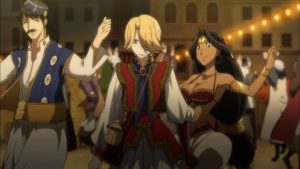 The boy hero in question here is Mahmut Tuğrul (Murase Ayumu), who as we meet him has just become the youngest Pasha in the Türkiye Stratocracy, having passed the military exam at the tender age of twelve. Mahmut lost his mother in the war with the Balt-Rhein Empire as a toddler, and was saved by the wily old Pasha Halil Şehir (Ogata Kenichi). Türkiye is fairly obvious – Balt-Rhein to its west seems to be something like the old Holy Roman Empire. Peace has persisted between the two sides ever since the war, but it’s a fragile one, and warfare seems perpetually on the verge of breaking out.
The boy hero in question here is Mahmut Tuğrul (Murase Ayumu), who as we meet him has just become the youngest Pasha in the Türkiye Stratocracy, having passed the military exam at the tender age of twelve. Mahmut lost his mother in the war with the Balt-Rhein Empire as a toddler, and was saved by the wily old Pasha Halil Şehir (Ogata Kenichi). Türkiye is fairly obvious – Balt-Rhein to its west seems to be something like the old Holy Roman Empire. Peace has persisted between the two sides ever since the war, but it’s a fragile one, and warfare seems perpetually on the verge of breaking out.
 As with Arslan Senki, the hero here is seemingly going to be dealing with as many (or more) threats inside his homeland than outside it. The council of Pashas (Divan) seems to be a mix of war-mongers and peaceniks (with age – and memories of the last war – an obvious factor). Zağanos Zehir (Furukawa Makoto) is a potential rival for Mahmut, dismissive of the young and emotional newcomer. The immediate threat comes from Virgillio Louis (Tsuda Kenjirou) a Balt-Rhein noble who’s intent on starting a war he believes the Empire (with a ten-to-one troop advantage) can’t lose. This he tries to do by assassinating one of his own ministers and framing Türkiye for the crime. Halil offers to sacrifice himself to prevent the war, but Mahmut takes it on himself to uncover the truth and save his friend and mentor.
As with Arslan Senki, the hero here is seemingly going to be dealing with as many (or more) threats inside his homeland than outside it. The council of Pashas (Divan) seems to be a mix of war-mongers and peaceniks (with age – and memories of the last war – an obvious factor). Zağanos Zehir (Furukawa Makoto) is a potential rival for Mahmut, dismissive of the young and emotional newcomer. The immediate threat comes from Virgillio Louis (Tsuda Kenjirou) a Balt-Rhein noble who’s intent on starting a war he believes the Empire (with a ten-to-one troop advantage) can’t lose. This he tries to do by assassinating one of his own ministers and framing Türkiye for the crime. Halil offers to sacrifice himself to prevent the war, but Mahmut takes it on himself to uncover the truth and save his friend and mentor.
 An awful lot happens in this first episode, but in Furuhashi’s steady old hands it’s quite cogent and easy to follow. Mahmut is a likeable lad – a poet, shy and awkward about women, skilled at war but cognisant of the value of peace. Big old epics like this one are often like locomotives, taking a little while to really gather speed, and I suspect Shoukoku no Altair will really show its best side once the story has a chance to catch the wind and fully unfurl. Unlike Arslan Senki I don’t believe we’re going to have a magic/supernatural element here, just politics, history and personal drama – but as someone who loves those things, that prospect is pure win for me. I’m not in love with this series yet, but we’ve started out on the right foot – and I still figure it’s going to end up as one of the best two or three shows of the summer.
An awful lot happens in this first episode, but in Furuhashi’s steady old hands it’s quite cogent and easy to follow. Mahmut is a likeable lad – a poet, shy and awkward about women, skilled at war but cognisant of the value of peace. Big old epics like this one are often like locomotives, taking a little while to really gather speed, and I suspect Shoukoku no Altair will really show its best side once the story has a chance to catch the wind and fully unfurl. Unlike Arslan Senki I don’t believe we’re going to have a magic/supernatural element here, just politics, history and personal drama – but as someone who loves those things, that prospect is pure win for me. I’m not in love with this series yet, but we’ve started out on the right foot – and I still figure it’s going to end up as one of the best two or three shows of the summer.
ED: “Taiyō no Aitōka” (たいようの哀悼歌) by Flower


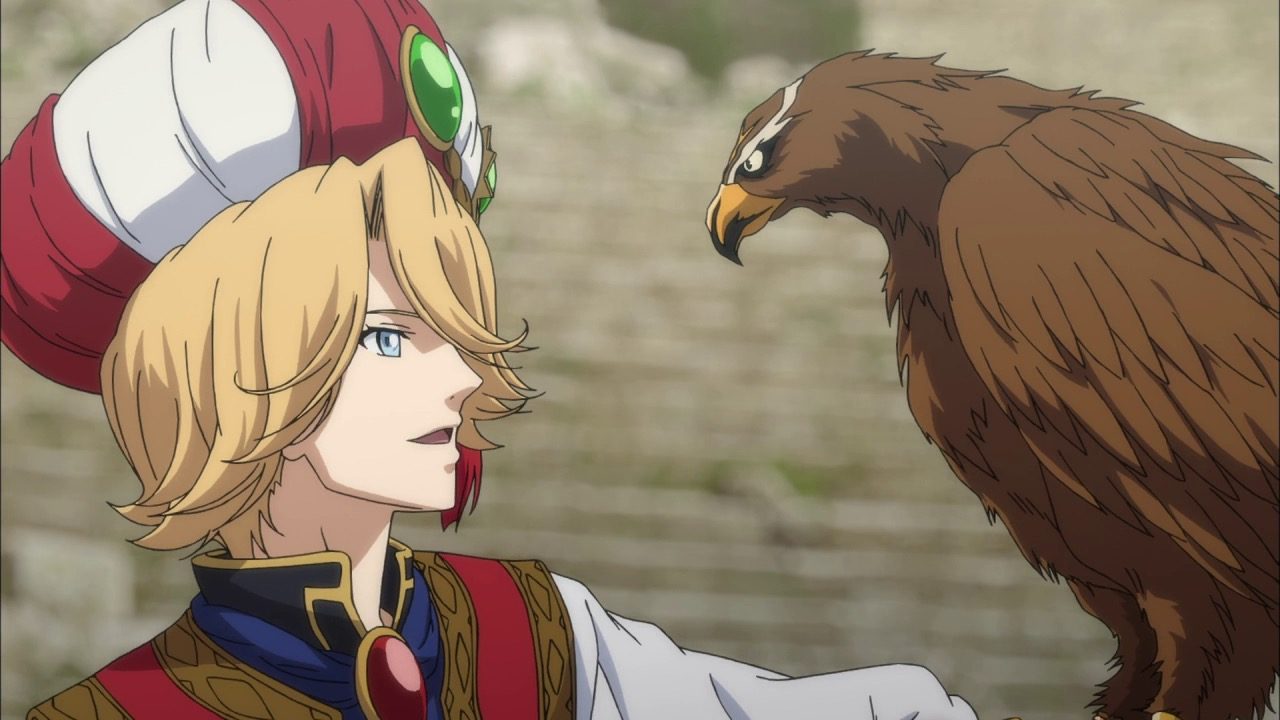

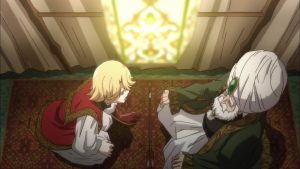

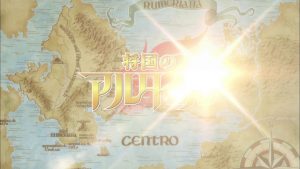




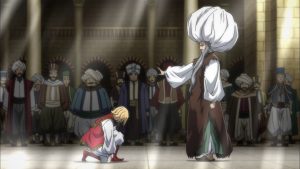


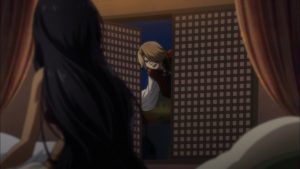
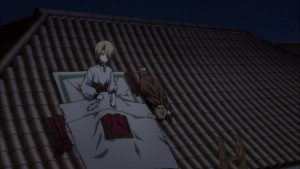


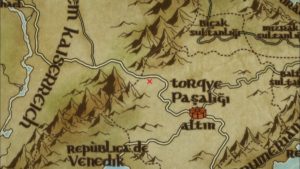
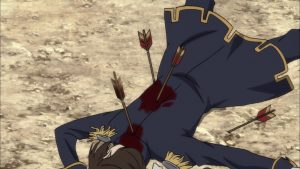


















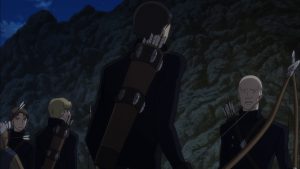
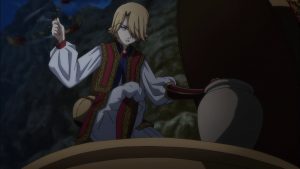

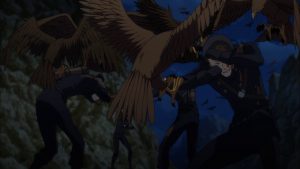
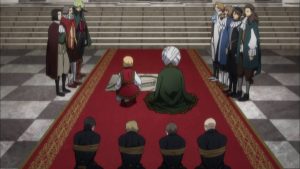













zeroyuki92
July 8, 2017 at 10:11 amWhile everything else are good/great, I’m pretty sure they skipped a ton of details of Mahmut investigation, especially revolving arrow conspiracy. It was way too fast.
Plus, I’m also pretty sure that you were thinking of Eastern Roman Empire (Byzantine) instead of HRE (Germans)
Guardian Enzo
July 8, 2017 at 11:08 amWell, “Rhine-Balt” suggests the HRE to me. Plus. they went to war with the Ottoman Turks on more than one occasion.
Zilla
July 9, 2017 at 7:38 amI can see a small similarity to Arslan, but it’s a pretty superficial one IMO. Arslan is about a kind child growing into who he needs to be so he can rule, relying on people who are smarter and stronger than he is, while going through the military battles, etc, that will regain his country from an occupying force. In this, Mahmut is already suffering from “smartest guy in the room” syndrome, he already has the knowledge and power. I mean, this is okay so far, but I think it reminds me more of the recent bits of Maji (manga).
Then again, I’m a bit of an Arslan-maniac, so my opinion is clearly biased.
zeroyuki92
July 9, 2017 at 9:55 amNVM Enzo, you’re right, I missed the obvious Rhine clue in there. I guess I should not have wached it in 3 AM
Earthlingzing
July 9, 2017 at 11:02 amI was worried at the start, but that ending set the stage for something amazing.
Greg
July 10, 2017 at 2:21 pmIt’s good to know in advance that this is supposed to unfold itself as an intelligent tale, because in this first episode the pacing seemed off and the plot execution overly simplistic, like they were going mostly for the exotic factor of Arslan, only this time using Turkey as the setting.
I think my Armenian friends probably wouldn’t be able to enjoy this even as a fantasy, they’d start fuming over how Turkey is being depicted as the victim here, which it certainly wasn’t in Medieval times.